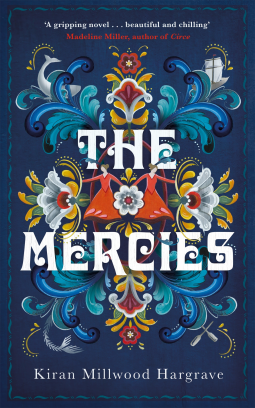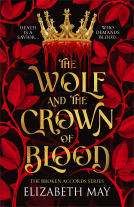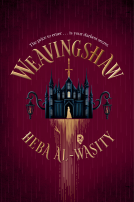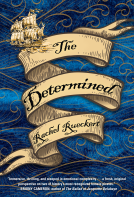
The Mercies
by Kiran Millwood Hargrave
This title was previously available on NetGalley and is now archived.
Send NetGalley books directly to your Kindle or Kindle app
1
To read on a Kindle or Kindle app, please add kindle@netgalley.com as an approved email address to receive files in your Amazon account. Click here for step-by-step instructions.
2
Also find your Kindle email address within your Amazon account, and enter it here.
Pub Date Jan 28 2020 | Archive Date Feb 27 2020
Pan Macmillan Australia | Picador
Talking about this book? Use #TheMercies #NetGalley. More hashtag tips!
Description
'A gripping novel inspired by a real-life witch hunt . . . Beautiful and chilling' Madeline Miller, author of Circe
On Christmas Eve, 1617, the sea around the remote Norwegian island of Vardø is thrown into a reckless storm. As Maren Magnusdatter watches, forty fishermen, including her father and brother, are lost to the waves, the menfolk of Vardø wiped out in an instant.
Now the women must fend for themselves.
Eighteen months later, a sinister figure arrives. Summoned from Scotland to take control of a place at the edge of the civilized world, Absalom Cornet knows what he needs to do to bring the women of Vardø to heel. With him travels his young wife, Ursa. In Vardø, and in Maren, Ursa finds something she has never seen before: independent women. But Absalom sees only a place untouched by God and flooded with a mighty and terrible evil, one he must root out at all costs.
Inspired by the real events of the Vardø storm and the 1621 witch trials, Kiran Millwood Hargrave's The Mercies is a story about how suspicion can twist its way through a community, and a love that may prove as dangerous as it is powerful.
PRAISE FOR THE MERCIES
'The Mercies took my breath away. A beautifully rendered portrait of a community, a landscape, a relationship, I read it with equal parts hope and dread. Kiran Millwood Hargrave has masterfully built up an incredible claustrophobic atmosphere, shot through with delicate intimacy. On finishing it I pressed the book to me, hoping to absorb some of her skill.' Tracy Chevalier, author of Girl With a Pearl Earring
'The Mercies is storytelling at its most masterful. This is an exquisite tale of sisterhood, of love, of courage and of what happens when communities turn on each other. It is everything I could have desired in a book: beguiling plotting, stunning prose, and a profound understanding of human nature. I have nothing short of awe for Kiran Millwood Hargrave and all she has accomplished here. I raged, I laughed, I cried. I urge you to read this novel' Elizabeth Macneal, author of The Doll Factory
'On an icy, dark island, men hunt witches and women fight back. Kiran Millwood Hargrave plucks a piece of 400-year-old legal history - a European king's prosecution of 91 people for witchcraft - and gives it a feminist spin. In clean, gripping sentences, the author is wonderfully tuned to the ways and gestures of a seemingly taciturn people. This chilling tale of religious persecution is served up with a feminist bite' Kirkus (starred review)
Advance Praise
"A gripping novel inspired by a real-life witch hunt. Hargrave's prose is visceral and immersive; the muddy, cold life and politics of a fishing village leap to vivid life. But her most vital insights are about the human heart: how terrifyingly quickly prejudices can turn into murder, and how desperately we need love and courage to oppose it. Beautiful and chilling." (Madeline Miller, author of Circe)
"The Mercies took my breath away. A beautifully rendered portrait of a community, a landscape, a relationship, I read it with equal parts hope and dread. Kiran Millwood Hargrave has masterfully built up an incredible claustrophobic atmosphere, shot through with delicate intimacy. On finishing it I pressed the book to me, hoping to absorb some of her skill." (Tracy Chevalier, author of Girl With a Pearl Earring)
Marketing Plan
Inspired by real historical events, The Mercies is a breathtaking story of love, fear and obsession, and the strength and courage of women.
Inspired by real historical events, The Mercies is a breathtaking story of love, fear and obsession, and the strength and courage of women.
Available Editions
| EDITION | Ebook |
| ISBN | 9781760789909 |
| PRICE | $6.35 (USD) |
Links
Average rating from 15 members
Featured Reviews
 Calzean J, Reviewer
Calzean J, Reviewer
It is a small world. Just 4 weeks ago I was in Vardo which is the scene of this most impressive novel which is based around the true events of a mighty storm that killed 40 men, the persecution of the Sami people and the infamous witches' trials of the early 17th century. There is a strange isolated but beautiful set of memorials at Vardo that pays tribute to the women murdered by the religious fervour, bigotry and fear of the time. The old fort which was the scene of the trials still is manned and is an eerie reminder of the history of Finnmark.
The book uses sparse and bleak language to capture the mood of the women of Vardo, their isolation and domination by men and religion. It also tells of how a tribe of fanatics formed under the newly arrived Commissioner sent to purify the town of its evil. To balance the bleakness of the story, there is a love story between the young Maren and the Commissioner's wife which adds some hope but is shrouded by the dominating and demented Commissioner.
Part The Handmaid's Tale, part Burial Rites but uniquely different this is one of my faves of 2019. My thanks to NetGalley for a chance to review and to https://www.goodreads.com/user/show/8... for his review which introduced me to this book.
 Jenny D, Reviewer
Jenny D, Reviewer
Thank you so much to Pan Macmillan for providing me with a copy of The Mercies, via Netgalley in exchange for an honest review!
Sometimes, because I read so many books, I feel like nothing much is unique any more, that I’m reading the same old thing over and over. The Mercies was NOT one of those books. Dark, atmospheric and utterly unique, this is a story hard to put into any box.
Set in Finmark in Northern Norway, a tiny town is thrown into chaos when a freak storm takes the lives of almost all the men on the island. As the women try to fend for themselves, even taking on tasks not permitted for women, such as fishing, the town starts to divide. Absolom is sent to the town upon rumours of the storm being an act of witchcraft. Having already been involved in recent witchcraft trials, he is determined to rid the small town of evil. Once the newcomers arrive, accusations of witchcraft begin to take over the town and only a select few women, Absolom’s new wife included, are willing to try and restore calm.
The Mercies was both a slow burn and a frantic book. Although the writing was beautiful and descriptive, leading us on a haunting journey through the desperate times of the villagers, it was also thrilling and had my heart in my throat on more than one occasion.
I’d highly recommend picking this one up!
In the 1600s in Norway, back when magic was believed and feared yet relied upon in their hours of darkest need, there was a little fishing town who lost everything when forty men perish in the sea when a sudden storm overtakes them. The community are shattered, losing their husbands, fathers, brothers, in one night and are left with nothing but their grief and a lack of a way forward.
Maren is our main character. In the storm she lost her father, older brother, and the man she was set to marry (however she may have felt about that at the time), and is left with her mother and sister in law. The sister in law isn't from around their parts, and is treated with suspicion at times when it comes to matters of the unnatural (her own father was a respected shaman), but women in the community have still gone to her for help falling pregnant, and the like.
Absalom is a man who comes to their small town years later, and is determined to bring religion and the fear of God into them. His main goal is to rid the land of those who follow the old ways, such as Maren's sister-in-law's shaman beliefs and rituals. With him he brings his new wife, Ursa. She fears yet respects her husband, but is also drawn to Maren who is likewise drawn to her.
This novel explores the place a woman has in the world - where sometimes they may have to step up to save their community from starvation but also be looked down upon for not keeping in their 'proper' place as a woman should. Also, their worth to their family; having to wed another to save their family financially. Mostly, fear. The setting of the harsh ice land brings this into sharp resolve as it perfectly sets the reader into the understanding of just how trapped they are there in all senses of the word.
Very bleak and absolutely gorgeous, and I loved Maren and Ursa's story. Hoorah for more queer historical fiction on our shelves.
The Mercies is a historical fiction novel from Kiran Millwood Hargrave, an award winning poet, playwright, and children’s author.
As Hargrave explains in a note, The Mercies is inspired by historical fact. In 1618 King Christian began a crusade to convert his subjects to his own religious persuasion and employed an enforcer to expose non-believers, particularly amongst the indigenous Sámi in Finnmark (Northern Norway). In all, fourteen Sámi men were executed, accused of sorcerery, but the Lensmann wasn’t satisfied with his remit, and over the next few years he was responsible for the trial, and execution of, 77 Norwegian women named as witches.
Hargrave begins her story in 1617 as a freak midwinter storm hits Vardø, Norway’s north-easternmost point, leaving the women of the island devastated as their fathers, brothers, husbands, and sons perish in the vicious squall. As the bodies of their men, dragged from the sea, lay shrouded awaiting spring’s arrival for burial, the womenfolk grieve, but once they are laid to rest they must confront their need for survival. Defying convention a small group take up the menfolk’s duties, among them twenty year old Maren Bergensdatter. For nearly three years the village manages in this way, led by Kirsten Sørensdatter, who also lost her husband.
The author skilfully evokes the isolated and harsh environment of Vardø, with its subarctic climate where the land is frozen solid during winter, and summer brings the midnight sun. The conditions in which the villagers live are generally basic, entire families live in one room huts, with fish, reindeer meat and potato bread providing the bulk of their diet, relying on infrequent opportunities for trade for additional resources.
All of the community attend church (kirke) weekly, but the beliefs of the indigenous Sámi have a place in the life of many. In the wake of the tragedy, with the absence of someone to blame for their misfortune, some women seek refuge in the teachings of the church, and their righteousness, born in part from the bitterness of grief, begins to divide the community. The arrival of Lensmann Absolom Cornet, an ambitious and pious Scotsman directed by the King to quash the ‘sorcery’ practiced by the Sámi, along with his new bride, Ursula, serves only to deepen the rift.
The Mercies unfolds from the perspectives of Maren and Ursula, both of whom are struggling with the changes in their lives. Maren, who lost her father, brother, and betrothed, must step up to support her widowed mother and pregnant sister-in-law who are consumed by their grief, and play peacemaker as the two women turn on each other. Ursula quickly discovers that her new husband is a prideful and often hateful man, and she is ill prepared for both the duties of a wife and life in Vardø. Despite their differences, the two young women unexpectedly find comfort in each other. Hargrave’s portrayal of their evolving friendship is achingly tender, and a counterpoint to the rising tension in both Ursula’s marriage and Maren’s community.
When it comes, the conclusion of The Mercies is powerful and devastating. Eloquent and beautifully crafted, this is a captivating novel about love, fear, obsession, and evil.
This novel is going to be one of the next big historical fiction titles this year.
Beautifully written prose, harsh and dark atmosphere with a bunch of strong and independent women.
Absolutely loved it and what a gorgeous cover!
Highly recommend this to anyone who likes historical fiction.
A big thank you to Netgalley for providing me with an eARC.
 Ana M, Reviewer
Ana M, Reviewer
I was really excited when I heard about The Mercies last year, and I was fortunate enough to receive an eARC from the publisher via Netgalley. I wavered a little when trying to decide what to rate it though. On one hand, I think it is an objectively good book. On the other, I didn’t enjoy it very much.
The two things that struck me the most were the world building and the writing. Millwood-Hargrave did a masterful job at transporting me to 17th century Vardø. It felt like I was completely immersed in the lives of the women who lived there. This was both a good thing, and a bad thing. Good, because it takes talent to achieve that. Bad, because I was equal parts bored with the minutiae of every day life, and anxious because of the oppressive atmosphere.
That’s another thing that was done really well. The atmosphere. Since this is a very character driven novel, told alternatively from Maren and Ursa’s perspectives, we get to see events as they unfold through the eyes of two characters who are very aware of the dangers, even if they don’t necessarily know what the exact outcome will be. As the fear, and bigotry amps up, and the accusations start flying, the tension is palpable.
The pacing throughout is quite measured. Then the climax crescendos very quickly, very close to the end, and then boom! The book is over. This seems to be a sort of signature for Millwood-Hargrave, because I had the same feeling of ‘that’s it?’ at the end of The Deathless Girls and The Girl of Ink and Stars.
Speaking of the end, I found it to be a bit unbelievable. I tried to do some of my own research to corroborate the story that was told, but my success was limited. This is why I don’t read a lot of historical fiction. I want everything to be factual, and to have references, and primary sources. Which is what non-fiction is.
In the end, I realised that this is an intensely psychological novel. There’s a plot, to be sure, but it is ultimately a meditation on womens’ survival, in so many different senses of the word. It is less concerned with historical accuracy, and more concerned with exploring the different ways women overcome.
After the storm takes the lives of every able-bodied adult male in their village, the women cling to each other and eke out a life on their own. They continue to do what is necessary to survive, even while they grieve. They cling to their faith and beliefs, in both Christianity and older traditions, to give them strength. Some choose to wield their faith like a weapon, lashing out at others for their pain and loss.
Others choose more practical outlets. Kirsten is most representative of all of these things- she chooses to wear trousers, she takes on a leadership role, she convinces the women to go out fishing, and she slaughters animals for the meat and hides. All socially acceptable – if you are a man.
Even Ursa, who is from the city of Bergen, is a survivor. She travels far from home, with a man she doesn’t know but to whom she is wed. She survives the journey, and she survives the realities of being a wife, with all that entails.
There are some pretty graphic scenes in this book- spousal rape, domestic violence, murder, violence- so that’s something to be aware of going in.
While I didn’t really enjoy The Mercies per se, I thought it was a compelling read. I found it hard to put down, even when I didn’t like what I was reading. I think it was well written, and it’s has some really thought-provoking themes.
The Mercies ended up being more than I expected. I was confused at the very beginning, but it only took a few chapters to realise what was happening. I decided to pick up the audiobook to read along with the physical book and wow, I'm so glad I did. There is no way my Australian accent could ever do this story any justice. The audiobook made the experience so compelling.
I found myself completely engrossed in the story, I don't usually like listening in the car but I HAD to! I NEEDED to know what was going to happen next. I was completely captivated.
The characters were well constructed and I found myself invested in the characters and forming strong opinions on others.
Overall I gave this book a 4.5 out of 5 stars.
 Gillian H, Reviewer
Gillian H, Reviewer
The Mercies by Kiran Millwood Hargrave is a compelling work of historical fiction. I was immediately drawn to this book by the gorgeous front cover. The description promised a fascinating and gripping read and I was not disappointed.
That the story is based around real historical events is of particular interest. My knowledge of Norweigan history is limited to Norse mythology (from a very English perspective). I had some idea of how the Sami have been treated but did not know much more. I’d never heard of the Vardø storm and wasn’t aware witch trials occurred in Norway (although I probably should have guessed). The Mercies did a really good job of bringing this period to life; I was absolutely transported to 17th century Norway. Both Vardø and Bergen felt very real. I have recently visited Bergen so was able to visualise, but the sense of place for both cities was very strong for me as a reader.
Kiran Millwood Hargrave is remarkably skilled in descriptive narrative and clearly did meticulous research for the book. From the first page, the reader is sucked into a richly detailed story compassing the vast Norwegian landscape to the minutiae of housekeeping. The details do not burden the narrative, rather they support the plot to develop a story with an extraordinary atmosphere.
This atmosphere is quite heavy, oppressive even, drawing strongly on the Norwegian landscape and the brutally beautiful power of the sea. The women living in the isolation of Vardø, and their reliance on the environment highlights the power of the men who arrive seeking to tame both them and the place they live.
The details contribute to the sense of oppression as they are built into the story, as well as cultivating a deep sense of the characters. The story is told from the perspectives of Maren and Ursa, but the depth of characterisation extends to the rest of the characters. The women of the village are a rich tapestry of characters. Each is grappling with abrupt changes, the challenges of survival and incredible grief; dealing with this in different, often damaging ways. My favourite character was Kirsten. Her strength and practical attitude were very appealing, and I liked her friendship with Maren. The relationship between Maren and Ursa was integrated into the story effectively, particularly how it built from their friendship, and though the conclusion of the story was somewhat unexpected, I thought it worked really well.
There were a lot of layers to the story. Careful to avoid spoilers, I will simply add that it uses a historical moment to explore friendship, love, community and society, and power, particularly patriarchal power. Overall, The Mercies is a beautifully written story with haunting settings and complex characters.
 Reviewer 422088
Reviewer 422088
Being a bit of a history buff I knew about James VI hatred of witchcraft and the result of this suspicion being the subjugation and torture of women, particularly in Scotland and England in the 16th and 17th century. I had no idea that it reached as far north as Norway and Finmark. Based on true events, the book tells the story of a community of women on a small island lose all of their menfolk in a freak storm and have to learn to fend for themselves. Although there is a limited presence of the native Sami people in the area they share knowledge and experience to survive in harsh conditions, staving off starvation while trying to overcome their grief.
When the new Commissioner comes to live in the community with his new wife the community is divided. Some try to curry favour and others court danger by flaunting their independence. A woman's role in society is clear and in these superstitious times, it's a crime to be self-sufficient. Soon talk of witchcraft turns neighbour against neighbour and sister against sister.
At the centre of the story are two women, one local and one brought from Norway by her husband. Together they face the harsh realities of the landscape and the times. This is a very quiet book - the style of writing is subtle and moving. A beautiful read.
I had issues downloading this book from netgalley.com earlier on in the year so ended up listening to the audiobook. I usually really enjoy historical fiction but I didn't completely love this book. I enjoyed the setting in Norway and finding out about life after the Vardo storm that wiped out the male population. I enjoyed the characters although listening to the audio book I was often confused to whose POV I was listening to. I didn't know anything about witch trials in Europe before this book so I definitely enjoyed reading about these elements. An enjoyable read/listen for anyone who enjoys historical fiction.
3 1/2 stars
Readers who liked this book also liked:
L.M Montgomery
Children's Fiction, Comics, Graphic Novels, Manga, Teens & YA
Marie Bostwick
Historical Fiction, Literary Fiction, Women's Fiction
Vicky Osterweil
Business, Leadership, Finance, Nonfiction (Adult), Politics & Current Affairs


















